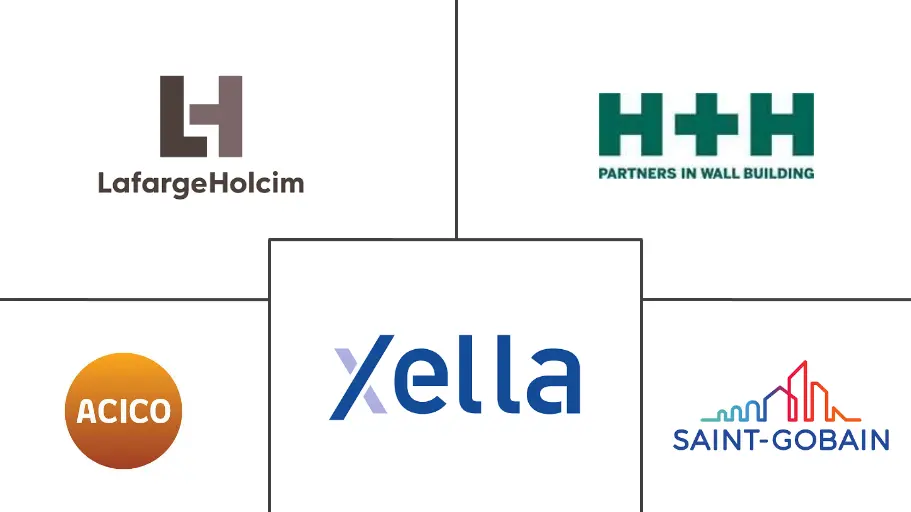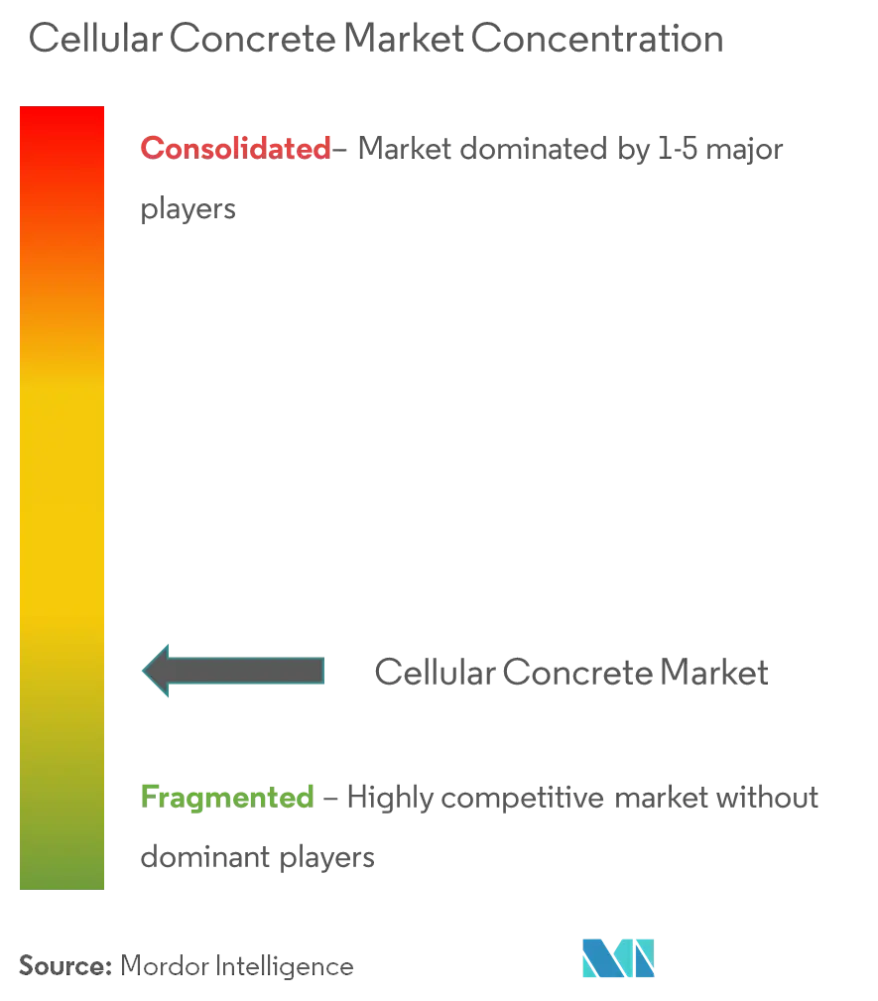Cellular Concrete Market Analysis
The Cellular Concrete Market is expected to register a CAGR of greater than 5.5% during the forecast period.
- Ease of availability of substitutes and issues with foam liquid concentrates are likely to hinder the markets growth.
- Emerging Trend of green building certifications and increasing demand for shock-absorbing concrete (SACON) are projected to act as an opportunity for the market's growth in the future.
- Asia-Pacific holds the major share in the consumption of cellular concrete. The region is also expected to witness the fastest growth during the forecast period, powered by the growth in residential, commercial, and industrial applications in the region.
Cellular Concrete Market Trends
Increasing Demand from Residential Construction
- Over the past 30 years, cellular concrete has been used in the residential sector both for new construction and repair and refurbishment in buildings. In residential buildings this advanced concrete product is applicable as un-reinforced wall blocks, hollow blocks, and insulation plates. It is also applicable as reinforced wall, roof and floor stuffs, division panels.
- A common application of cellular concrete is as insulation material for roofs. In most applications cellular concrete is either used by itself or coupled with insulation foam to provide required insulation.
- Cellular concrete is used for decks and floors where thermal insulation and noise control are requirements of the designer. The use of cellular concrete provides a cost-effective way to install floors in apartment buildings and high rises, since the material is low density and has great workability.
- Cellular concrete is also utilized in the construction of precast wall systems for residential buildings. Its lightweight nature, coupled with its resistance to moisture damage, makes it a practical and an environment-friendly product.
- Cellular concrete is majorly used in Europe and Asia-Pacific. Residential construction is witnessing stable growth in Asia-Pacific, with India and China registering significant growth. ASEAN countries have also gained momentum in residential construction. The market is expected to grow during the forecast period.
- Further, increasing awareness among consumers, especially in developed nations, regarding energy benefits associated with green homes, is expected to drive the cellular concrete market in the residential sector over the forecast period.
China to Dominate the Market in Asia-Pacific Region
- China dominated the Asia-Pacific market share. With growing investments and the construction activities in the country, the demand for cellular concrete is projected to grow during the forecast period.
- The continuous improvements in economic conditions in the region have enhanced the financial status of the consumers, in turn, boosting the demand for buildings and other infrastructural activities in the country.
- China’s 13th Five Year Plan started in 2016 as it was an important year for the country’s engineering, procurement, and construction (EPC) industry. In addition to this, the country ventured into new business models domestically and internationally, during the year. Although the construction sector slowed down after 2013, it is still a major contributor to the GDP of the country.
- The country has been spending over USD 100 billion every year to continue building the leading rail system in the world. By 2020, network for high-speed railways is expected to reach 30,000 kilometers, and by 2025, it is expected to further reach 38,000 kilometers.
- Moreover, restrictions on foreign investment on land development, high-end hotels, office buildings, international exhibition centers, and construction and operation of large theme parks have also been lifted. The growth in infrastructure and transportation sectors is expected to boost the cellular concrete market in the country, over the forecast period.
Cellular Concrete Industry Overview
The market for cellular concrete is fragmented, with numerous players. The major players include H+H, Saint-Gobain, LafargeHolcim, Xella Group, and ACICO, among others.
Cellular Concrete Market Leaders
-
H+H
-
Saint-Gobain
-
LafargeHolcim
-
Xella Group
-
ACICO
- *Disclaimer: Major Players sorted in no particular order
Cellular Concrete Industry Segmentation
The global cellular concrete market report includes:
| Application | Blocks, Panels, Arches, Lintels, Slabs | ||
| Thermal and Sound Insulation in Floors, Walls, Roofs | |||
| Filling of Voids, Cracks, and Cavities | |||
| Dike Protections, Mooring Lines, and Ports, Construction of Floating Structures | |||
| Protection of Communication Lines and Pipes | |||
| Foundations and Backfills in Construction of Roads, Bridges, Tunnels, and Underground Railways | |||
| Other Applications | |||
| End-user Sector | Residential | ||
| Non-residential | Commercial | ||
| Industrial | |||
| Other Non-residential Constructions | |||
| Geography | Asia-Pacific | China | |
| India | |||
| Japan | |||
| South Korea | |||
| ASEAN Countries | |||
| Australia and New Zealand | |||
| Rest of Asia-Pacific | |||
| North America | United States | ||
| Canada | |||
| Mexico | |||
| Europe | Germany | ||
| United Kingdom | |||
| Italy | |||
| France | |||
| Nordic Countries | |||
| Russia | |||
| Rest of Europe | |||
| South America | Brazil | ||
| Argentina | |||
| Rest of South America | |||
| Middle-East and Africa | Saudi Arabia | ||
| South Africa | |||
| Rest of Middle-East and Africa | |||
Cellular Concrete Market Research FAQs
What is the current Cellular Concrete Market size?
The Cellular Concrete Market is projected to register a CAGR of greater than 5.5% during the forecast period (2025-2030)
Who are the key players in Cellular Concrete Market?
H+H, Saint-Gobain, LafargeHolcim, Xella Group and ACICO are the major companies operating in the Cellular Concrete Market.
Which is the fastest growing region in Cellular Concrete Market?
Asia Pacific is estimated to grow at the highest CAGR over the forecast period (2025-2030).
Which region has the biggest share in Cellular Concrete Market?
In 2025, the Asia Pacific accounts for the largest market share in Cellular Concrete Market.
What years does this Cellular Concrete Market cover?
The report covers the Cellular Concrete Market historical market size for years: 2019, 2020, 2021, 2022, 2023 and 2024. The report also forecasts the Cellular Concrete Market size for years: 2025, 2026, 2027, 2028, 2029 and 2030.
Our Best Selling Reports
Cellular Concrete Panels Industry Report
Statistics for the 2025 Cellular Concrete market share, size and revenue growth rate, created by Mordor Intelligence™ Industry Reports. Cellular Concrete analysis includes a market forecast outlook for 2025 to 2030 and historical overview. Get a sample of this industry analysis as a free report PDF download.







